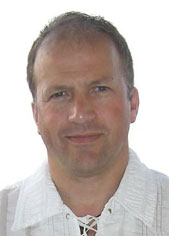
Frame 25 interviews: Simon Bradley, project manager
In the second of our interviews with leading exponents of broadcast’s cutting edge – those who work with the very latest technologies – we bring you exclusive insights from project manager Simon Bradley.
The need for traditional engineering skills is disappearing as demand for people with knowledge of networks and new technologies increases. We’re bringing you information about engineering roles you might not currently know even exist so you can stay ahead of developments and plan your career with knowledge and insight.

Simon Bradley, a project manager with a professional background that’s more varied than most…
F25: How did you get started as a project manager?
SB: By accident! Then again, I don’t know anyone who decided they wanted to be a project manager at school. I finished in the forces, did some consultancy work for them and sort of floated across into mainstream consulting. At some point “consultant” morphed into “project manager” and that was that….
F25: What kind of projects do you work on?
SB: I’ve run projects ranging from the relocation of a 16-square-kilometre manufacturing plant from Russia to India, to a small software code release on an internal system, in industries ranging from banking, defence and utilities to broadcast TV, cinema and pubs. But these days generally I work on projects related to aviation or television (either satellite broadcast or OTT).
F25: What are you currently working on?
SB: I’m working on a couple of infrastructure projects for Sky TV and a couple of aviation projects for my own company.
F25: What’s life like as a PM?
SB: Variable. It can be incredibly intense, frantically busy and absolutely full-on one moment…and then be very relaxed, borderline boring, the next. Some projects and/or clients are always crazy busy, usually because someone has mucked up the estimates for time or cost, while others are very steady indeed. It’s the busy ones that are the most fun.
F25: What skills do you need to be successful in your role?
SB: Patience, tact, a very thick skin and a sense of humour. I find the ability to get on with people, to influence them and to understand what they actually want is far more important than an in-depth technical understanding.
In fact, that in-depth understanding can be a hindrance as a deeply technical PM can find themselves trying to design the solution and getting buried in minutiae rather than taking an overview and managing the project as a whole.
Having said that, the ability to quickly grasp technical concepts and recognise when an issue might arise is very handy indeed.
I also find my ability/willingness to get dirty helps with physical stuff sometimes – I’ve dragged cables, helped carry racks, whatever it takes. If there’s a bottleneck because of a resource shortage then there’s no point in being precious…
F25: Have you always worked in this industry?
SB: No, I have also been a military helicopter pilot, motorcycle courier, journalist and photographer. I still am a photographer and journalist, as well as doing aviation consultancy.
F25: Tell us more about some of the specific technologies you use?
SB: I rely heavily on Microsoft Project, Word and Excel, but other than that I tend to use voice technologies like Skype or Lync a lot because the role is as much about communication as doing plans and charts.
F25: How do you see your role changing in the future?
SB: Well I don’t see myself being replaced by a robot any time soon. But in my case at least I am finding myself running programmes as much as projects, which I have to admit is less enjoyable as the opportunity to get hands-on is one step further removed.
F25: What is the most engaging or exciting part of your job?
SB: Tricky question. The most rewarding thing for me is knowing that I’ve made a difference, that the project I’ve just delivered makes someone’s working life easier or better, makes a genuine difference to a company or, better yet, actually does some good. I like being busy, being under pressure and I like being able to come up with new and creative ways of solving problems.
Conversely, working on a project which nobody cares about, which doesn’t really matter and which presents no challenges whatsoever is, to me, close to hell.
F25: What advice would you give to someone looking to work in this field?
SB: I’d advise anyone wanting to be a PM to look at what it actually entails first. I’d suggest they concentrate on interpersonal skills and personal organisation, and that they practise herding cats until they at least vaguely understand the realities of trying to get disparate parts of a business to work together, despite their agendas.
Then I’d suggest they try a junior role on contract and be willing to step in and pick stuff up wherever they can. Oh, and try to get into an industry in which they are interested rather than one that they might notionally believe pays best because the only way to succeed at this is to care about what you’re doing enough to engage.
F25: If you could give your 16-year-old self some advice now, what would it be?
SB: Keep at it – most of the decisions you’re going to make will be the right ones. And the ones which are wrong will hurt at the time but you’ll learn and grow from them.